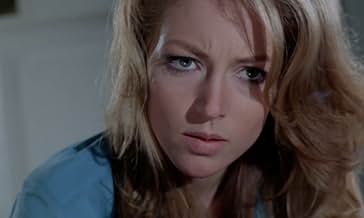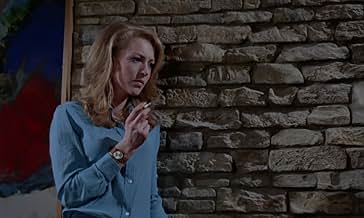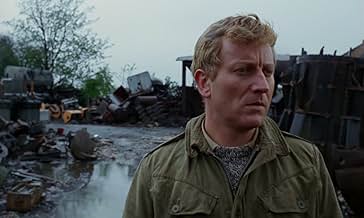Robbery
- 1967
- 1h 50m
IMDb RATING
6.9/10
2.1K
YOUR RATING
A group of British criminals plan the robbery of the Royal Mail train on the Glasgow-London route.A group of British criminals plan the robbery of the Royal Mail train on the Glasgow-London route.A group of British criminals plan the robbery of the Royal Mail train on the Glasgow-London route.
- Awards
- 1 win
Patrick Jordan
- Freddy
- (as Patrick Jordon)
Kenneth Farrington
- Seventh Robber
- (as Ken Farrington)
Roger Booth
- Detective
- (uncredited)
Ron Charles
- Seaman
- (uncredited)
Storyline
Did you know
- TriviaIt was the realistic car chase through the streets of London in this picture, that led to director Peter Yates doing another car chase in San Francisco a year later. Steve McQueen personally wanted Yates for what turned out to be his highest grossing film Bullitt (1968).
- GoofsWhen the traffic warden puts the gas canister in the car, a white cable can be seen draping from the inside of the door and this is seen to be connected to the device as he removes it from his bag. There is no sign of the cable in the following close-up shot from his point of view.
- Quotes
Paul Clifton: We're talking about millions of pounds now. We're talking about road blocks, car searches, house raids, shakedowns. They'll know who pulled the job. Without the money, they can't prove anything.
- ConnectionsFeatured in Film Review: Film Review (1967)
Featured review
British Peter Yates drove race cars before becoming a director and turning out some pedestrian work and a couple of respectable films, including this one and "Bullitt." Steve McQueen, another racing aficionado, having seen the spectacular car chase through the streets of London in this film, invited Yates to direct him in "Bullitt" the following year, and there is a certain concordance between the two. "Bullitt" (1968) is superior. The interrelationships are more subtle, the musical score more apt. The score in "Robbery" shrieks "generic thriller" and lacks anything like the sophistication of the flute trio in San Francisco's chic Coffee Cantata. And if the car chase in "Robbery" is thrilling -- and it is -- the high speed pursuit in "Bullitt" provides a touchstone for all the car chases that followed, from "The Seven Ups" to "The French Connection." There was never anything like it before.
Basically, "Robbery" has Stanley Baker in charge of one of those gangs consisting of specialists, one expert in electronics, another in laundering, another who knows how to be a locomotive engineer, and so forth. The heist of more than three million pounds from the Royal Mail train is tense, engaging, and a little confusing. The confusion is compensated for by the many times we see references to "Royal Mail," which sounds infinitely better than "U. S. Postal Service." "Royal Mail." It doth roll trippingly from the tongue.
No guns are displayed or used, in contrast to "Bullitt", and even in the later film there are only two brief scenes involving gunplay. The fact is that guns aren't always necessary in robberies like the one described here. Imagine, two freaky looking dudes wearing black ski masks and threatening you with crowbars tell you to drive a locomotive at 20 miles per hour, and you're a balding, near-sighted, middle-aged man. Are you going to drive that locomotive at the speed requested? You bet you are. "No guns," orders Stanley Baker. "They don't use them so we won't either." On the other hand, "Bullitt" was made in America for an American audience and the final shot is of a .38 caliber police revolver in its holster, wrapped in its shoulder harness, lying on the bathroom sink, all coiled up like a rattlesnake.
"Robbery" is a caper movie. The police are always just one step behind the gang. The gang's hideout is at a now deserted and dilapidated base called RAF Gravesley, a bomber base that once accommodated Halifaxes and Mosquitoes. It's an eerie feeling to be in a once-populated and now empty community.
I had that experience at Fort Hancock, established during the Revolutionary War to guard New York harbor from the British. It was closed during the Cold War and all its personnel departed except for a handful of Coast Guardsmen, with whom I stayed for a summer. All the empty buildings were unlocked. The hospital staff had left its microscope slides carefully packed in drawers. There was the occasional pile of 20 mm. rounds, still intact. I had a similar feeling watching the scenes shot at RAF Gravesley. It was like being in an episode of The Twilight Zone.
Overall, nice job, and an entry for Peter Yates into the Big Money of Hollywood.
Basically, "Robbery" has Stanley Baker in charge of one of those gangs consisting of specialists, one expert in electronics, another in laundering, another who knows how to be a locomotive engineer, and so forth. The heist of more than three million pounds from the Royal Mail train is tense, engaging, and a little confusing. The confusion is compensated for by the many times we see references to "Royal Mail," which sounds infinitely better than "U. S. Postal Service." "Royal Mail." It doth roll trippingly from the tongue.
No guns are displayed or used, in contrast to "Bullitt", and even in the later film there are only two brief scenes involving gunplay. The fact is that guns aren't always necessary in robberies like the one described here. Imagine, two freaky looking dudes wearing black ski masks and threatening you with crowbars tell you to drive a locomotive at 20 miles per hour, and you're a balding, near-sighted, middle-aged man. Are you going to drive that locomotive at the speed requested? You bet you are. "No guns," orders Stanley Baker. "They don't use them so we won't either." On the other hand, "Bullitt" was made in America for an American audience and the final shot is of a .38 caliber police revolver in its holster, wrapped in its shoulder harness, lying on the bathroom sink, all coiled up like a rattlesnake.
"Robbery" is a caper movie. The police are always just one step behind the gang. The gang's hideout is at a now deserted and dilapidated base called RAF Gravesley, a bomber base that once accommodated Halifaxes and Mosquitoes. It's an eerie feeling to be in a once-populated and now empty community.
I had that experience at Fort Hancock, established during the Revolutionary War to guard New York harbor from the British. It was closed during the Cold War and all its personnel departed except for a handful of Coast Guardsmen, with whom I stayed for a summer. All the empty buildings were unlocked. The hospital staff had left its microscope slides carefully packed in drawers. There was the occasional pile of 20 mm. rounds, still intact. I had a similar feeling watching the scenes shot at RAF Gravesley. It was like being in an episode of The Twilight Zone.
Overall, nice job, and an entry for Peter Yates into the Big Money of Hollywood.
- rmax304823
- Apr 15, 2017
- Permalink
Details
- Release date
- Country of origin
- Language
- Also known as
- Überfall
- Filming locations
- Leyton Stadium, Brisbane Road, Leyton, London, England, UK(Paul Clifton plans the train robbery with Frank, Dave, Ben and Don during a football match)
- Production companies
- See more company credits at IMDbPro
Contribute to this page
Suggest an edit or add missing content




































